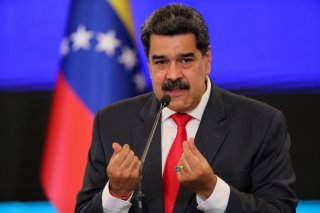Biden Eased Sanctions on Venezuela and Got Nothing in Return
The United States is not lifting sanctions in exchange for any kind of concession from the Venezuelan regime.
On Tuesday, the Biden administration eased the U.S. policy of sanctions against the Venezuelan regime of Nicolas Maduro.
The administration has specifically eased restrictions on American oil companies with operations in Venezuela. According to U.S. officials, the Treasury Department issued a “narrow license” that authorizes Chevron to negotiate on “potential future activity” in Venezuela.
Since the summer of 2019, the Treasury’s Office of Foreign Assets Control (OFAC) has prohibited American oil companies from increasing their presence in Venezuela’s oil fields. Since then, companies like Chevron have only been allowed to incur transactions necessary for the maintenance of “essential operations” or the “wind-down of operations.”
The sanctions relief comes after U.S. officials visited Caracas in early March, which ultimately led to the release of two Americans that had spent years detained in Venezuela. One of these is Gustavo Cárdenas, a former executive of the Venezuelan-owned but U.S.-based oil company CITGO. He had been detained since 2017, alongside five other executives.
This move represents a complete shift from President Donald Trump’s policy of “maximum pressure” against the Venezuelan regime. On Monday, the Biden administration also announced the lifting of Trump’s sanctions on Cuba, which included a limit on remittances and a ban on flights outside Havana. It is expected that the Biden administration will continue to ease U.S. sanctions on both regimes.
Last week, eighteen Democrats in Congress wrote an open letter to President Joe Biden, arguing that the sanctions on Venezuela were “one of the leading causes” for the country’s unprecedented humanitarian crisis; and that because of it, they should be lifted.
Even though the sanctions have not been effective at achieving their intended effect of achieving a peaceful transition to democracy in Venezuela, it is also a fact that the sanctions did not cause the humanitarian crisis currently going on in Venezuela.
While the sanctions began in August 2017, Venezuela has been in a recession since the fourth quarter of 2013. The country has also been experiencing the highest inflation rate in the world since that year. And Venezuela’s major shortages of food and medicine can be traced all the way to the late 2000s. All these occurred despite oil prices being at a record-high price at the time, which resulted in Venezuela receiving oil revenues equivalent to roughly a trillion dollars during the Chavez administration (from 1998 to 2013).
Venezuela’s vice president, Delcy Rodriguez, confirmed on Twitter that the United States government authorized American and European oil companies to “negotiate and restart operations in Venezuela.”
“Venezuela aspires that these decisions of the United States of America pave the way for the absolute lifting of the illegal sanctions that affect all of our people,” Rodríguez added.
Regarding European companies, Italy’s Eni and Spain’s Repsol are the two European majors operating in the Venezuelan oil fields. Since 2019, European companies have also been prohibited by the U.S. Treasury from increasing production or incurring any transaction with the Venezuelan government or its state-owned oil company, PDVSA.
In the past, I have argued for the strategic use of the sanctions policy, as these geoeconomic tools should not be seen as an end by themselves but as a way to leverage America’s position abroad. In Venezuela specifically, the sanctions should be used to negotiate further “concessions” from the Maduro regime in matters related to the political and economic freedoms of the Venezuelan people, which are currently tragically decimated.
What the Biden administration is doing could not be further from that. The United States is not lifting sanctions in exchange for any kind of concession from the Venezuelan regime. Quite the opposite, Biden seems to be giving a pass to Maduro’s authoritarian regime simply because of pressures coming from oil companies eager to do business in Venezuela.
From a geopolitical perspective, this shows a lack of grand strategy from the United States. If something should be learned from the war in Ukraine, is that doing business with authoritarian regimes should be seen with more caution than in the past. It is a matter of national security to make sure that those who oppose freedom and democracy do not have the means to advance their autocratic cause—within and beyond their territories.
Biden’s move is also detrimental when it comes to the United States’ reputation globally, especially in Latin America. Instead of guaranteeing that the United States will always side with those who believe in a free, democratic, and prosperous Latin America, the United States is doubling down on its regional reputation of being willing to partner with dictators whenever they have an interest in doing so.
For these reasons, with this move, President Biden is not strengthening the United States’ position in Latin America in general, and Venezuela specifically. In fact, in the long run, this is a bad deal, just like trading a queen for a pawn. In this deal, an American oil company will see the financial benefits of extracting a few more hundred thousand barrels of oil per day in Venezuela. Meanwhile, the American people will see their geopolitical position diminished, and the Venezuelan people will see their democratic cause abandoned.
Jorge Jraissati is the Director of Alumni of Students For Liberty, an NGO with over 2,800 freedom activists in 117 countries. Jorge’s work is focused on establishing alumni initiatives aimed at advancing liberal democracy and economic development in several countries. Jorge is an economist by training and is currently conducting research about the Venezuelan crisis at IESE Business School. Jorge's work has been presented at universities like Cambridge and Harvard and published at places like Foreign Policy and Oxford University Press.
Image: Reuters.

